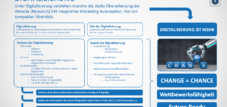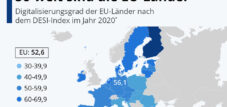The most common and worst mistakes in digitalization and why it is not a one-time process
Language selection 📢
Published on: June 20, 2024 / update from: June 20, 2024 - Author: Konrad Wolfenstein

The illusion of immediate solution: How digitization becomes an endless journey instead of the targeted sprint - Image: Xpert.digital
📈💡 Digitization: opportunities, risks and frequent mistakes
🌟 a basic problem
A basic problem often arises in the consulting phase. Companies often use digital hubs with supposed experts who have extensive digital competence, but do not come from the industry in question, such as mechanical engineering. These experts may shine in theory, but their solutions do not always withstand practice. This grievance often leads to solutions that are not practical in the specific industrial environment. It is therefore essential that the theory of practice has to withstand in order to offer actual added value.
🎯 The meaning of the strategy
In addition to the choice of consultants, the strategy also represents a critical success factor. The approach of a startup differs fundamentally from that of a large company. Digital experts from startups are not automatically prepared to cope with the complex structures and requirements in mechanical engineering or in other industrial branches. A wrongly oriented or poor strategy can therefore have far -reaching negative consequences. Comprehensive concepts are required for large companies that are specially tailored to their needs and structures.
🔄 flexibility and adaptation
Another essential element of digitization is the continuous adaptation and revision of the technologies and processes used. The digital landscape is changing rapidly, and what is considered innovation today can already be outdated tomorrow. Flexibility and the willingness to constantly revise are therefore essential. Those who act rigidly in digital transformation risk losing the connection and working inefficiently.
🔗 dependencies on third parties
A frequently overlooked aspect in the introduction of digital technologies is the development of dependencies on third parties and service providers. These dependencies can have serious consequences, especially if they go hand in hand with hidden costs and long -term fees. Adequate control and careful contract design are therefore necessary to avoid nasty surprises. License fees in particular can become a permanent financial burden that the budget breaks.
💾 data quality
One of the most common consequences of incorrect digitization is poor data quality. Data is the heart of the digital transformation, and inadequate data quality inevitably leads to faulty analyzes and decisions. This can not only interfere with the operating sequence, but also negatively influence the strategic direction of the company. To avoid this, companies must ensure that their data is correctly collected, saved and analyzed.
🔧 seamless integration
The implementation of digital solutions should always be seamlessly integrated into existing systems and processes. Too often lead to a lack of integration and insufficiently dimensioned digitization measures to cross -departmental silos and inefficient work processes. Only through a holistic approach can it be ensured that digital solutions offer real added value and increase productivity.
📚 Training of employees
Another critical mistake is the lack of onboarding and the insufficient training of employees in dealing with new digital tools and technologies. The acceptance and efficiency of new systems depends largely on how well the employees can understand and apply these technologies. Without appropriate training measures, not only acceptance, but also the productivity and efficiency of employees. Regular and comprehensive training programs are therefore a must.
🌐 Cultural change
An often overlooked, but also essential aspect of digitization is cultural change in the company. The introduction of new technologies changes working methods and requires rethinking among employees at all levels. It is crucial that management promotes digital culture that supports innovation and continuous improvement. This begins with the communication of goals and visions and extends to the creation of an environment in which employees are encouraged to try out new ideas and approaches.
💻 Man at the center of digitization
With all the technological advances, people should be at the center of digitization. Technologies should make work easier and not complicate. Therefore, digital solutions should be user -friendly and intuitive. This not only increases acceptance, but also promotes the productivity and satisfaction of the employees.
🔒 Data security and legal requirements
Another important topic in the context of digitization is data security. With increasing digitization, the threat from cyber attacks also increases. Companies must therefore develop robust security strategies and continuously update in order to protect their data and systems. This not only includes technical measures, but also the training of employees in the safe use of digital tools and sensitive information.
In addition, compliance with legal regulations and data protection guidelines plays a critical role. This is particularly important in countries with strict data protection laws, such as the General Data Protection Ordinance (GDPR) in Europe. Companies must ensure that their digital practices are in line with the applicable laws in order to avoid legal consequences.
⚙️ Complexity of successful digitization
Successful digitization is a complex undertaking that requires careful planning, continuous adaptation and a deep understanding of both technology and your own business area. Companies must be aware of the potential traps and take proactively take measures to avoid them. This is the only way to fully exploit the enormous advantages of digitization and assert yourself against the competition.
📣 Similar topics
- 📣 Avoid frequent errors in digitization
- 📊 importance of data quality for digital success
- 🔍 Expert selection in digitization advice
- 📚 employee training as a success key in digitization
- 🔄 continuous adaptation in digital transformation
- 💼 Strategy adaptation for digitization in large companies
- 🔗 seamless integration of digital systems
- 🔧 handling of dependencies on third -party providers
- 🌐 Cultural change in the age of digitization
- 🔒 Security strategies and compliance in the digital age
#️⃣ hashtags: #digitization #data quality #experten election #mit employee training #daticherheit
Our recommendation: 🌍 Limitless reach 🔗 Networked 🌐 Multilingual 💪 Strong sales: 💡 Authentic with strategy 🚀 Innovation meets 🧠 Intuition
At a time when a company's digital presence determines its success, the challenge is how to make this presence authentic, individual and far-reaching. Xpert.Digital offers an innovative solution that positions itself as an intersection between an industry hub, a blog and a brand ambassador. It combines the advantages of communication and sales channels in a single platform and enables publication in 18 different languages. The cooperation with partner portals and the possibility of publishing articles on Google News and a press distribution list with around 8,000 journalists and readers maximize the reach and visibility of the content. This represents an essential factor in external sales & marketing (SMarketing).
More about it here:
📌 Other suitable topics
🚀 continuous digitization
🌟 Digitization is more than just the introduction of new technologies and digital tools into a company - it is a fundamental change that affects almost all areas of a company and requires continuous development. In contrast to a business model, a unique selling point or the establishment of a team, digitization is not a one -time process, but an incessant journey that requires constant adjustments, revisions and further developments.
🌐 The fundamental dynamics of digitization
The fundamental dynamics of digitization lies in the fast and continuous development of technologies. Innovations are done at a breathtaking pace and what is still considered progressive today could be outdated tomorrow. Companies must be ready to adapt to these technological developments and continuously invest in new solutions in order to continue to remain competitive. The ability to react quickly to technological changes becomes a decisive competence.
📈 constantly changing customer requirements
In addition, the requirements and needs of customers are constantly changing. In the digital world, customers expect personalized experiences, immediate answers and seamless interactions across various channels. A constant review and optimization of the digital offers is essential in order to meet the changing expectations of customers. Companies that do not keep up, risk, to lose market shares to more agile and more innovative competitors.
⚖️ Regulatory challenges and compliance
In addition to the technological and market-driven changes, companies are subject to continuous regulatory framework and new compliance requirements. Laws and regulations, such as data protection laws, are constantly changing and have a direct impact on the implementation of digital strategies. Companies must ensure that their digital systems and processes meet current legal requirements at any time in order to minimize legal risks.
🏅 digital solutions as a strategic advantage
Digital solutions are also constantly being developed in highly competitive markets in order to exceed the competition. The frequency of innovation is extremely high in many industries; Companies therefore have to continuously take new ground and develop innovative digital solutions to keep or expand their market position. Digitization becomes a strategic advantage here, which does not even have to be developed again and again.
🔄 Adjustments in internal changes
Internal changes in companies, such as restructuring, mergers or acquisitions, also require adjustments to the digital strategy. Such changes mean that digital processes and systems are flexible and adaptable. This is the only way to do justice to the new corporate structures and continue to work efficiently.
📊 Data management as a backbone of the digital economy
Another central aspect of continuous digital transformation is data management. Data is the backbone of the digital economy. You always have to be up -to -date, complete and correct to enable well -founded decisions. This requires continuous data management and seamless integration of the digital systems. Companies that invest here create the basis for high -quality data -driven analyzes and decision -making processes.
👥 man in the center of digitization
Last but not least, people play a central role in digitization. The introduction of new technologies and digital solutions requires rethinking and continuous training of the workforce. Employees not only have to be able to serve the new systems, but also understand them and recognize their advantages. This requires regular training courses and a fertile environment for the exchange of knowledge.
🌱 Promotion of a digital corporate culture
Another important factor is to promote digital corporate culture. It is important to establish a culture of openness to new technologies and continuous improvement. Such a culture not only supports the acceptance of digital changes, but also promotes innovation and agility within the company. A company that successfully integrates a digital culture creates an environment in which continuous digitization is not perceived as a burden, but as an exciting opportunity.
🛠️ Development and adaptation of a digitization strategy
It is also important that companies develop a clear digitization strategy and adjust it regularly. Such a strategy should not only include the introduction of new technologies, but also take into account integration into existing processes and systems. A successful digitization strategy is flexible and customizable in order to be able to react to changing framework conditions and new technological trends.
🌟 The dynamic journey of digitization
Digitization is not a one -off process, but represents an ongoing, dynamic journey. Companies must be willing to constantly adapt to new circumstances, to review and further develop their digital solutions. This is the only way to use the enormous opportunities of digitization and remain competitive in the long term.
Continuous digitization ensures that companies increase their efficiency, better adapt to market changes and always offer their customers the best solutions. Every company that wants to be successful in the digital era must therefore recognize the need for ongoing further development and act accordingly. The future belongs to those who do not understand and accept digitization as a project, but as an ongoing task.
📣 Similar topics
- 🚀 The dynamic development of digitization
- 💡 Constant innovation as the core of the digital transformation
- 📊 Data management as a key to digital economy
- 🛠️ Flexibility and adaptation in digital processes
- 👥 employee training for successful digitization
- 🌐 seamless integration and update of digital systems
- 📈 Customer -oriented digital strategies
- ⚖️ regulatory requirements in the digital world
- 🏅 digital thinking as a strategic advantage
- 📣 Promotion of an open digital corporate culture
#️⃣ hashtags: #digitization #innovation #datenmanagement #flexibility #customer satisfaction
🌐🔍 Triosmarket ✅ is an innovative marketing strategy for online, digital and meta -verse marketing or symbols
Triosmarket is an innovative marketing strategy consisting of three main components, each using its own approaches and methods to achieve comprehensive and impactful market coverage.
More about it here:
We are there for you - advice - planning - implementation - project management
☑️ SME support in strategy, consulting, planning and implementation
☑️ Creation or realignment of the digital strategy and digitalization
☑️ Expansion and optimization of international sales processes
☑️ Global & Digital B2B trading platforms
☑️ Pioneer Business Development
I would be happy to serve as your personal advisor.
You can contact me by filling out the contact form below or simply call me on +49 89 89 674 804 (Munich) .
I'm looking forward to our joint project.
Xpert.Digital - Konrad Wolfenstein
Xpert.Digital is a hub for industry with a focus on digitalization, mechanical engineering, logistics/intralogistics and photovoltaics.
With our 360° business development solution, we support well-known companies from new business to after sales.
Market intelligence, smarketing, marketing automation, content development, PR, mail campaigns, personalized social media and lead nurturing are part of our digital tools.
You can find out more at: www.xpert.digital - www.xpert.solar - www.xpert.plus
































